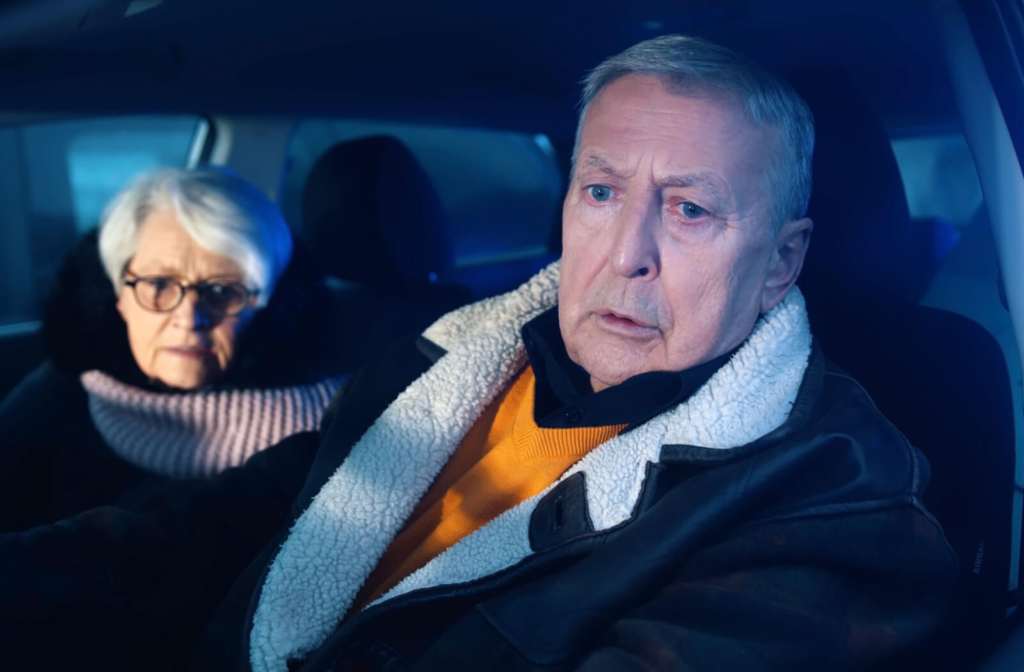Driving at night can be difficult at any age, especially if you have a preexisting vision problem. Between glare, difficulty seeing in the dark, or a delayed reaction time, it can be difficult to do so safely. But why does it become more difficult as you age?
As you get older, your eyesight naturally gets worse. Over time, your eyes can become more sensitive to glare, and you may have difficulty with contrast in different lighting. When this is mixed with a slower reaction time and decreased depth perception, driving at night can be much more difficult for seniors.
By visiting an optometrist for regular comprehensive eye exams, you can detect potential vision problems before they begin to affect your day-to-day life. Your optometrist can help you manage your eye health as you age, and may be able to offer vision correction methods to make driving at night easier.
Why Does Night Driving Become Especially Difficult in Late Adulthood?
As you get older, your eyes naturally begin to get worse. You may struggle to see things clearly, especially in low-light conditions. Some of the more common changes that occur to your eyes with age include:
- Reduced ability to adjust to different lighting
- Decreased depth perception
- Increased glare sensitivity
- Reduced visual acuity, making it more difficult to see things at a distance
All of these problems directly affect nighttime driving. With oncoming headlights, sensitivity to glare can be problematic and cause temporary vision issues. Difficulty with depth perception can make it difficult to determine when it’s safe to change lanes, turn, or slow down. And the inability to adjust to sudden lighting changes (like in tunnels or under streetlights) can cause vision problems.
Since each of these vision changes affect driving, it can become more difficult to drive safely at night. If you notice these changes, it’s best to limit nighttime driving and take precautions when it’s a must. Wearing prescription eyeglasses or contact lenses can help with many of these problems.
What Other Factors Can Affect Your Ability to Drive at Night?
With age comes other factors that can make driving at night more difficult.
As you get older, the natural lens of your eye becomes less flexible and less clear. Due to the eye being affected by so many age-related changes, your vision tends to naturally get worse with time. Cataracts are also a common occurrence—in fact, half of Americans over the age of 75 develop cataracts at some point.
Additionally, medication plays a huge part in vision problems. Many medications, like antidepressants or painkillers, can cause drowsiness or difficulty focusing, which makes it unsafe to drive.

Even if a person only struggles with 1 or 2 of these problems, it can become significantly more difficult to drive in the dark. It’s also important to consider the potential external factors, like bad weather, stress, or fatigue.
It’s also common to have slower reflexes as you get older, and when all of these factors are combined, it can make driving at night much more difficult.
Alternatives to Nighttime Driving for Seniors
If you or a loved one are struggling with driving at night, it’s best to consider some alternatives. For example, where possible, carpooling with another driver is always an excellent choice. Public transportation can be a useful tool. Rideshare services can also be a great option.
By planning ahead and taking proper precautions, you can make the right choice to stay safe on the road.
How Your Eye Doctor Can Help
If you’re struggling with seeing at night, it may be related to natural vision changes, or a symptom of another condition. It’s important to go in for regular comprehensive eye exams to ensure that your vision is the best it can be!
Your eye doctor can assess your vision and may be able to provide vision correction to make it easier to see and drive at night. To learn more about caring for your eye health as you age, book an exam with the team at Metro Eyecare.


